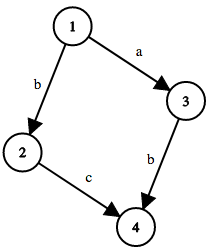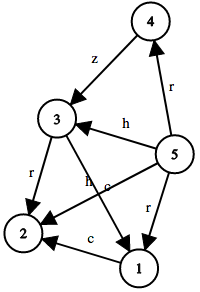As we all know, Max is the best video game player among her friends. Her friends were so jealous of hers, that they created an actual game just to prove that she's not the best at games. The game is played on a directed acyclic graph (a DAG) with n vertices and m edges. There's a character written on each edge, a lowercase English letter.

Max and Lucas are playing the game. Max goes first, then Lucas, then Max again and so on. Each player has a marble, initially located at some vertex. Each player in his/her turn should move his/her marble along some edge (a player can move the marble from vertex v to vertex u if there's an outgoing edge from v to u). If the player moves his/her marble from vertex v to vertex u, the "character" of that round is the character written on the edge from v to u. There's one additional rule; the ASCII code of character of round i should be greater than or equal to the ASCII code of character of round i - 1 (for i > 1). The rounds are numbered for both players together, i. e. Max goes in odd numbers, Lucas goes in even numbers. The player that can't make a move loses the game. The marbles may be at the same vertex at the same time.
Since the game could take a while and Lucas and Max have to focus on finding Dart, they don't have time to play. So they asked you, if they both play optimally, who wins the game?
You have to determine the winner of the game for all initial positions of the marbles.
The first line of input contains two integers n and m (2 ≤ n ≤ 100,  ).
).
The next m lines contain the edges. Each line contains two integers v, u and a lowercase English letter c, meaning there's an edge from v to u written c on it (1 ≤ v, u ≤ n, v ≠ u). There's at most one edge between any pair of vertices. It is guaranteed that the graph is acyclic.
Print n lines, a string of length n in each one. The j-th character in i-th line should be 'A' if Max will win the game in case her marble is initially at vertex i and Lucas's marble is initially at vertex j, and 'B' otherwise.
4 4 1 2 b 1 3 a 2 4 c 3 4 b
BAAA ABAA BBBA BBBB
5 8 5 3 h 1 2 c 3 1 c 3 2 r 5 1 r 4 3 z 5 4 r 5 2 h
BABBB BBBBB AABBB AAABA AAAAB
Here's the graph in the first sample test case:

Here's the graph in the second sample test case:
 题意:给定一个有向无环图,有n个节点,边上的权值为小写字母。max和lucas在玩一个游戏,两人轮流走,max先走。每次走的边的权值需要大于等于上一轮另一个人走的权值。谁先走不动了谁就输了。输出max在i,lucas在j(1<=i,j<=n)时的赢家,max赢输出A,lucas赢输出B。
题意:给定一个有向无环图,有n个节点,边上的权值为小写字母。max和lucas在玩一个游戏,两人轮流走,max先走。每次走的边的权值需要大于等于上一轮另一个人走的权值。谁先走不动了谁就输了。输出max在i,lucas在j(1<=i,j<=n)时的赢家,max赢输出A,lucas赢输出B。
思路:采用记忆化搜索,用dp[i][j][c]表示当前回合者在i,对手在j,且上个回合走过的字母为c时当前回合者是否会输。遍历结点所连接的边,若无路可走或无论怎么走对手均获胜,记录状态dp[i][j][c]为2,表示位于此状态时该回合者必输。若此状态下对手无路可走,则记录状态为1,表示位于此状态时当前回合者可获胜。
代码如下:
#include <bits/stdc++.h>
using namespace std;
int dp[110][110][30];
char G[110][110];
int n,m;
int dfs(int x,int y,int c)
{
if (dp[x][y][c])
return dp[x][y][c];
for (int i=1;i<=n;i++){
if (G[x][i]-'a'>=c&&(dfs(y,i,G[x][i]-'a')==2))
return dp[x][y][G[x][i]-'a']=1;
}
return dp[x][y][c]=2;
}
int main()
{
while (~scanf("%d %d",&n,&m)){
memset(G,0,sizeof(G));
memset(dp,0,sizeof(dp));
for (int i=0;i<m;i++){
int x,y;
char c;
scanf("%d %d %c",&x,&y,&c);
G[x][y]=c;
}
for (int i=1;i<=n;i++){
for (int j=1;j<=n;j++){
if (dfs(i,j,0)==1)
printf("A");
else
printf("B");
}
printf("\n");
}
}
return 0;
}




















 649
649

 被折叠的 条评论
为什么被折叠?
被折叠的 条评论
为什么被折叠?








